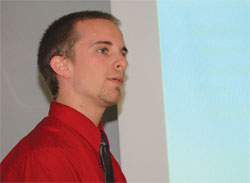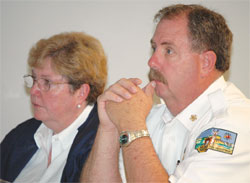University Communications and Marketing
College of Business students fired up over potential of regional training facility
July 30, 2009
Contacts:
Dr. Jenny Leonard, College of Business, 657-1689
Dan Carter, University Relations, 657-2269
In business plan, senior students provide independent market, financial and management analysis for city officials
MSU BILLINGS NEWS SERVICES — Give some college business students a good idea, a problem to solve with a bit of direction and the combination can be pretty combustible.
In this case, it fueled enthusiasm comprehensive fire training. And some day in the future, a state-of-the-art, multi-agency-supported fire training facility could be developed thanks in part to business direction offered by some Montana State University Billing students.
“This was one of the most extensive business cases that I’ve seen,” said Dr. Gary Young, the dean of the College of Business. “I was very impressed.”
 Before summer classes started in May, Dr. Jennifer Leonard grabbed a hold of an idea
to offer a section a senior-level business strategies class in the College of Business.
The class, which typically runs over 16 weeks during the normal semesters and is notorious
for its intensity and workload, involves development of a business strategy for a
client. Doing it in summer would be unique, she said, because it would mean doing
a project in 10 weeks.
Before summer classes started in May, Dr. Jennifer Leonard grabbed a hold of an idea
to offer a section a senior-level business strategies class in the College of Business.
The class, which typically runs over 16 weeks during the normal semesters and is notorious
for its intensity and workload, involves development of a business strategy for a
client. Doing it in summer would be unique, she said, because it would mean doing
a project in 10 weeks.
And the project would not be easy: Understanding the feasibility and developing a business plan for a regional fire training facility in the Billings region.
Working as a team, the dozen students in the class divided the workload and developed a plan that impressed city officials and the students alike when they made a formal presentation recently at the College of Business.
“Given the deadlines and the scope of the project, we were motivated to get it done,” said Jesse Blaylock, a senior and one of the co-leaders of the project.
 The project, very much in the early stages, was dubbed the Yellowstone Regional Academy
by the students and would be used to provide state-of-the-art comprehensive training
for firefighters who work in rural, urban, airport, industrial and wildland settings.
A group of city, airport and other professionals have had discussions about the idea,
said Paul Dextras, chief of the Billings Fire Department, but wanted to get a sense
of what the business and marketing plan might look like before they proceeded.
The project, very much in the early stages, was dubbed the Yellowstone Regional Academy
by the students and would be used to provide state-of-the-art comprehensive training
for firefighters who work in rural, urban, airport, industrial and wildland settings.
A group of city, airport and other professionals have had discussions about the idea,
said Paul Dextras, chief of the Billings Fire Department, but wanted to get a sense
of what the business and marketing plan might look like before they proceeded.
The students developed a plan that would locate a facility on 10 acres in the Billings Heights that would be away from residential areas but easily accessible. Start-up costs for purchase of land and construction and environmental assessments were estimated at about $8 million.
Some of the students did a market analysis, indentifying the opportunities, threats and strengths of the idea, while others worked on financial and management aspects. They identified grant opportunities that would help raise start-up funds; developed proposals for potential revenue generation; proposed partnerships with MSU Billings College of Technology and its fire sciences program and wrestled with the complexities of environmental and siting issues. The city was charged only $100 for materials related to research and final presentation.
While the specifics would need to be worked out, the idea has merit and would be feasible.
“There is no comprehensive training center in the region that has to offer what the Yellowstone Regional Academy has to offer,” Lindsey Byars, a senior finance major said. “Because of the power of the College of Technology’s involvement and partnerships, this works. Others don’t have the power of the accredited program that the COT has to offer.”
The end result was a recommendation to move forward with something that could put Billings on the map, the students said.
Embracing the enthusiasm of the students, Dextras said he was looking forward to delving deeper in the final report and getting others involved in the fire training center discussion.
“I get a lot of energy and positive ideas from you,” Dextras said. “This plan is going to be a blueprint for what we’re going to do in the future. I really looked forward to this day and this project.”
Billings City Administrator Tina Volek said she appreciated the independent analysis of the project and will make use of it.
“In a 10-week timeframe, thins involved far more to get done than what is presented in the classroom,” she said.
Both Dextras and Volek said while results may not be immediate, the students can rest assured their work would be taken seriously.
“This has the potential to have a huge impact on myself and this community,” Dextras said. “It will help all those key players involved move this project forward.”
The co-leaders of the 12-student team each said the work was hard, but rewarding, especially in light of the potential effects.
“It was grueling and very time consuming, but ultimately very gratifying,” said Mike Walker, another senior finance major. “The best part was understanding the ultimate potential for the scope of this project. It could potentially impact lives beyond the grade we receive for it.”
Leonard is currently looking for business owners who need help with business plans for the fall semester Management 488: Business Strategy class. Leonard emphasizes that the project not only adds value to area businesses, but will provide a valuable educational experience for MSU Billings students.
There is a track record of success in the public/private endeavors, College of Business educators note. For example, in January 2005, Ken Lutton, owner of Technology By Design, started his business with a business plan created by students. He turned his two-car garage into an office and started to build his business solving the computer problems of small businesses and individuals. Today, he has more than 700 clients and a staff of four. This year, he moved his business into new office space at 1445 Avenue B.
Among other things, the students’ business plan gave Lutton:
- A comprehensive analysis of his proposed marketing strategy using proven marketing concepts
- An Excel financial model of his proposed business on a CD, including five-year pro forma financial assumptions, income statements, balance sheets, and statements of cash flow. In addition, he received 10-year free cash flow analyses using payback, net present value, and internal rate of return concepts. The students linked the Excel worksheets, so Lutton could do “what if” financial analyses (e.g., what if sales grew at 10% instead of 5%, etc.).
For more information on how to request a business plan, please call Leonard at 657-1689;
fax her at 657-2327; or e-mail her at jleonard@msubillings.edu.
In addition, those interested in having a business plan developed should provide
a brief history of the business and explain where you would like to see the business
in 5-10 years.
MSU Billings student Mike Walker completes a presentation to city of Billings officials about the potential of a regional fire training facility. The presentation was part of the development of a business plan that students do in senior-level strategies class.
FIRST PHOTO ABOVE: MSU Billings student Mike Walker making his presentation to city of Billings officials
SECOND PHOTO ABOVE: City Manager Tina Volek and Fire Chief Paul Dextras
